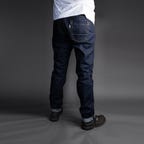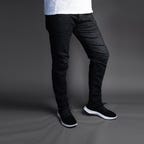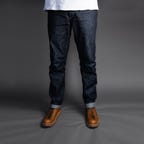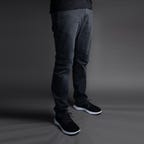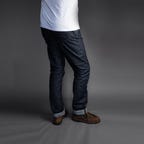 Why You Can Trust CNET
Why You Can Trust CNET How to Buy More Sustainable Denim Jeans Online
From looking for organic cotton to simply buying quality that will last longer, here's how to buy jeans more sustainably.
The fashion industry is one of the biggest drains on environmental resources, and denim jeans are no exception, with thousands of liters of water needed to make a single pair of jeans. But as more companies start using 100% organic cotton, sustainable materials like hemp and bamboo and more environmentally friendly production practices, it's possible to buy denim jeans that don't have quite such a destructive footprint.
We've put together some tips on how to buy denim more sustainably, as well as some suggested brands we've tried and tested ourselves. Check back, as we'll keep this list updated as more companies add eco-focused ranges into their offerings.
Look for organic materials and sustainable manufacturing processes
Many clothing manufacturers are switching over to much more sustainable production processes, including the use of organic cotton, recycled materials, fewer harmful chemicals and dyes, and methods that include less wastage of materials or water. And usually, these companies are only too keen to tell you about it, so it's typically quite easy to find products made with more ethical practices.
Look out for companies displaying the Soil Association, Global Organic Textile Standard, Organic Cotton Standard or B Corp logos that show that they're openly working with industry bodies that monitor their environmental impact. Transparency in the production line -- including where materials are sourced, where they're produced and what practices are used (or avoided) during production should be openly stated -- allowing you to double-check the claims.
And yes, that means doing more research and spending time finding their sustainability pages or looking at the FAQs about their production practices. If there's no mention of any environmental efforts, then it's possible that it's simply not a priority for the company, and you can look elsewhere.
Shop locally
Buying items from the other side of the world means having the items shipped by air freight. That adds the environmental impact of the flight on top of the impact of the product itself. Looking toward more local brands that stock and ship items from a closer location will help minimize this impact. It's unlikely that you happen to live in the same town as your favorite jeans manufacturer, but shopping within your country may at least allow for shorter delivery journeys.
Based in the UK, HebTroCo uses 100% organic cotton in its long-lasting heavyweight jeans.
In the UK, I found two great brands; Hiut Denim based in Wales, and HebTroCo based in a town called Hebden Bridge. Both companies are in areas historically associated with clothing manufacturing, and both rely on local workforces in the production of their products.
So while both Hiut and HebTroCo use 100% organic cotton and sustainable practices in their production, there's also the social benefits of buying from smaller, local brands to consider in your purchases.
Buy cheap buy twice
Good denim tends not to be cheap, and sustainable denim is often even less so. Bringing that cost down to basic high street levels often relies on mass production where the focus is on maximizing production at minimal cost, rather than looking toward quality or sustainability. Fast fashion relies on cheaper items and encourages manufacturers to always be looking toward lowering that bottom line.
But it's often the case that you get what you pay for, and as the price goes up, so too does the quality of the materials and the attention to detail in the manufacturing process. It might not always be the case -- and it likely still differs from manufacturer to manufacturer -- but the brands tested here produce quality items at a variety of prices. The heavyweight Selvedge denim used by Asket, HebTroCo and Hiut feels like it can put up with a lifetime of abuse, while things like stitching quality is top-notch across the board.
So rather than have 10 or more pairs of cheap jeans in your collection, consider having just a couple of beautiful, well-made classics that will stand the test of time.
Buy classics that you'll love for longer
Every item of clothing you own will have an environmental impact, so the biggest step you can make in minimizing that is to not replace your whole wardrobe of clothes with new items each season. Jeans are a great wardrobe staple as they remain a fashion classic every year that pair well with almost any other item.
But it still helps to consider whether the particular style you're considering is particularly "of the moment" or whether it will age as gracefully as you do. That's not always easy to judge, of course, but I personally try to look toward classic denim colors and more straight-leg or slim cuts. My huge, baggy skater jeans from my teens don't get much of a look-in these days, and none of us miss that odd fashion trend of jeans that come pre-splattered with lots of paint. Do we?
Hiut Denim's No Wash Club encourages you to avoid washing your jeans altogether for at least the first six months.
Wash less often
Water usage in clothing production is huge, especially with denim. And while looking toward organic production and water-efficient manufacturing methods is a great first step, you can help minimize further water usage in the lifetime of your jeans by simply washing them less often.
Jeans typically don't need washing as often anyway. Certainly not after every wear and maybe not after many wears. In fact, there's a lot of discussion in the denim world around avoiding washing for very long periods of time. This isn't just for reducing water consumption, but some denim -- especially Japanese Selvedge denim -- is designed to naturally age with time as you wear them and washing them in a machine can artificially accelerate that process, which can spoil the look of jeans.
Hiut denim even has what it calls "the no wash club," which encourages its customers to go at least six months before first washing its jeans. As its website explains, "the longer you can leave a new pair of jeans without washing them, the more beautiful a pair of jeans you will have at the end of it."
Levi's CEO Chip Bergh went so far as to say he's never washed some of his jeans and, like Hiut, recommends an infrequent washing cycle.
Measure yourself in advance to avoid extra shipping
While it's easy to simply send back a pair of jeans if they don't fit you properly and get a different size, you're adding a lot of mileage -- often by air -- onto the footprint of your jeans with that back and forth. Spending the time at the ordering stage to properly measure yourself and your existing jeans and double-checking those numbers with the manufacturer's sizing guides will make it more likely that the size you get is the size you need.
Buy used
If you want some new style in your wardrobe but want to minimize your shopping impact as much as possible, then consider not buying new jeans at all. Looking toward local vintage stores, clothing markets or even thrift stores could help you unearth some classic items at a fraction of the cost, while avoiding the impact of producing a new pair.
Made from heavy-duty 16-ounce Japanese Selvedge denim, HebTroCo's M16 jeans are extremely hard-wearing, with a deep Indigo color that I expect will age beautifully over time. They're cut slim without being skinny, with an extended leg to allow for a turn-up at the cuff to show off the Selvedge stitching stripe on the inside.
The denim itself comes from the Candiani mill in Italy (rated as one of the greenest mills in the world) and the jeans are made by hand in the UK. The attention to detail is superb, and I have no doubt that these jeans will still be going strong many years from now.
The name BAM comes from the fact that these jeans are made from cotton blended with bamboo. Bamboo needs less room to grow than cotton and requires less water and fewer pesticides so its potential impact on the environment is lower. Visually you probably wouldn't notice any difference as the jeans we tested -- in both black and traditional Indigo -- look like any other jeans.
Put them on though and you'll feel the other benefit of bamboo; it's super soft. BAM's jeans are exceptionally comfortable to wear, with a large amount of stretch that makes them just as comfy for hiking or traveling in as they are for just standing around with a beer at the pub.
There are no metal rivets to be seen, and the button even unscrews, which all allows for easier recycling of the jeans once they eventually reach the end of their useful life.
Asket is seemingly going out of its way to be extremely upfront about the impact of all its items, with its website outlining the extent it can trace the supply chain of all the elements of its items (it can trace every single element of these raw denim jeans). It also gives a breakdown of the environmental impact of each of its items and highlights exactly which factory where different components were made -- and even how much the employees there earn.
Asket also promotes the idea of having fewer, but more meaningful, classic wardrobe essentials that don't change seasonally and its Raw Japanese Selvedge Jeans are a good example of this. They're a classic cut that fits well and its 13-ounce weight gives them a hard-wearing feel, without feeling overly stiff or bulky. I found them comfortable to wear all day and, yes, they're made from 100% traceable, organic, cotton.
Based in New York, Mott & Bow aims to provide jeans at more approachable prices, and while not all its denim is organic, it sources its materials from the Orta Anadolu mill in Turkey, which has a variety of certificates relating to its sustainable production practices. Mott & Bow's jeans are then produced by hand in the company's own family-run factory in Honduras, which allows them to ensure fair living costs.
The company is soon launching a range of 100% organic denim, along with models that use sustainable materials like Hemp and recycled polyester.
The Slim Stone jeans I tried were extremely comfortable to wear, with a good stretch in the material that makes them easy to move around in. The denim has a medium 11.5-ounce weight, which means they're heavy-duty enough to put up with a good deal of wear throughout their life.
Hiut Denim's jeans are made in the small Welsh town of Cardigan, which for decades had been a hub of jeans production until the factory closed in 2001. Hiut Denim has picked up where that company left off, using the local skills to hand-produce its jeans in Wales.
The denim comes from the ISKO mill in Turkey, which has a variety of initiatives for greener production from reducing water usage and material waste. The Japanese Selvedge denim is 100% organic.
Hiut also has the "no wash club," which encourages its customers to not wash their jeans for the first six months of use. And while this is to help bring out the natural aging of the denim, the extra benefit is in cutting down the water usage from washing. The jeans we tested are heavyweight, with a great fit and a quality that we have no doubt will handle whatever we throw at them.
I also tested Hiut's Tech Jeans Pro, which include recycled polyester and cotton and are designed to help regulate body heat in both cooler and warmer climes. The material is a lot thinner than its Selvedge Hack jeans which I worry may make them less hardwearing over time, so it's worth being more cautious when wearing these otherwise beautiful-looking black denims.


